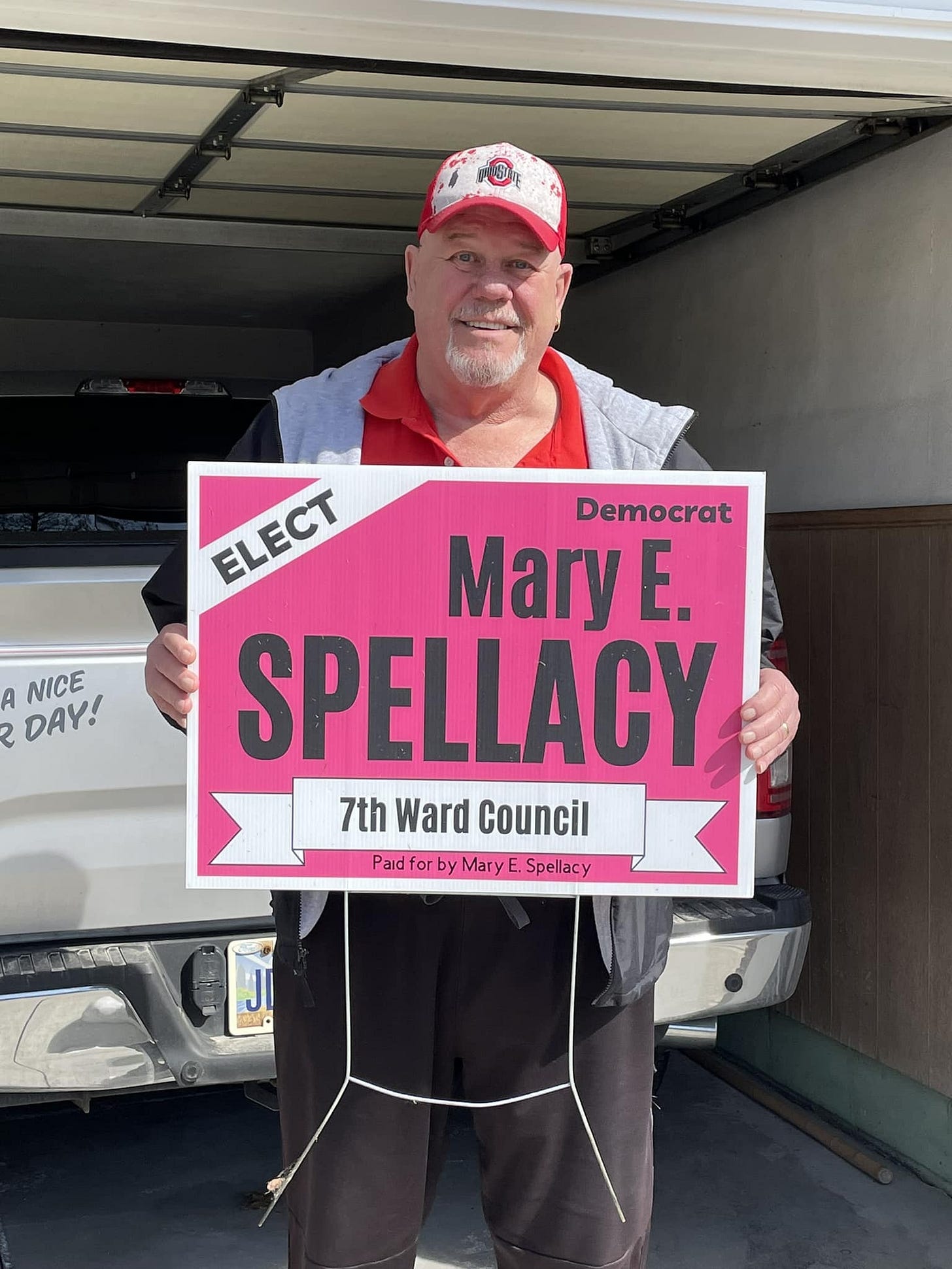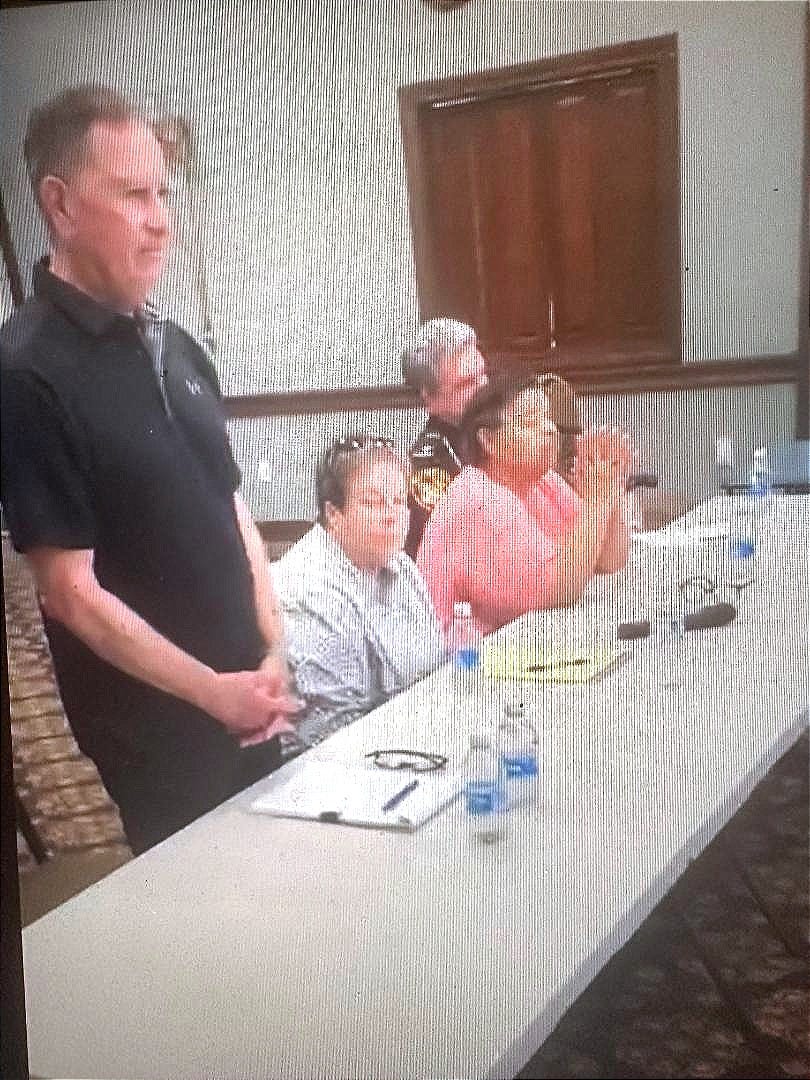"A Town Hall for Some: The Night Lorain Officials Shut the Door on Transparency"
By Aaron C. Knapp | Lorain Politics Unplugged
I. A Gathering in the Shadows
On a quiet evening in Lorain, an event billed as a "town hall" unfolded at the Morningside HOA clubhouse. At first glance, it seemed like a community dialogue: a place where concerned citizens and elected officials could engage in public discussion. Instead, it quickly became a moment of confrontation—a litmus test for the health of transparency in local government.
Garon Petty, a well-known local journalist and government watchdog, attended the event with his wife. They were personally invited by their city council representative. They arrived in good faith, expecting an open forum. What happened next exposed deeper issues about the way public business is conducted in Lorain—and who gets to witness it.
“I was invited by our councilperson,” Petty later said. “Nobody told us it was only for Morningside residents. And when I looked around, there were people there who definitely weren’t Morningside residents. There was a judge candidate, a few council people, and others I didn’t recognize.”
Councilwoman Springowski and an unidentified individual began speaking loudly across the room toward Petty and his wife, singling them out without ever directly approaching. The comments escalated into what Petty later described as a "tongue-lashing"—a verbal reprimand that culminated in the assertion that the event was a "private meeting." Only after this verbal exchange were Petty and his wife explicitly told they needed to leave. The message was unmistakable: they were not welcome to stay and observe. The tone and volume of the remarks clearly signaled that he and his wife were expected to leave. This did not come from a uniformed officer or security detail, but rather from someone affiliated with the HOA, seemingly prompted by a whispered exchange with one of the council members present.
In a video recording of the incident, Councilwoman Mary Springowski sounded audibly agitated. She remarked, “I can tell that obviously you’re recording me, and now I’m going to be broadcast.” Her tone underscored a clear discomfort with being filmed, despite the public setting and her role as an elected official. “I can tell that obviously you’re recording me,” she said. “And now I’m going to be broadcast.” Her tone made it clear she was uncomfortable with being captured on video, despite the public nature of the event and her status as an elected official.
Petty calmly responded, “Are we in public?” The question hung in the air.
“I live in the 7th Ward,” Petty clarified. An unidentified voice—possibly an HOA representative—interjected: “I hear you, sir, but this is private property.”
Petty pushed back again: “Is this a private meeting?” The same voice replied, “It is a private meeting.”
Looking around the room, Petty pointed out the hypocrisy: “The prosecutor, the mayor... and you’re going to have a private meeting without the rest of us?” When no answer came, he concluded, “Yeah, I’m leaving.”
Later, Petty stated publicly that he followed up with the Lorain County Sheriff, who was present at the event in uniform. According to Petty, the sheriff consulted with the county prosecutor and confirmed that, based on the number of public officials present and the sheriff's own participation in an official capacity, the gathering indeed qualified as a "public meeting" under Ohio’s Open Meetings Act.
The exchange, brief as it was, revealed the deeper question at play: can public officials hold public business meetings behind closed doors, on private property, and eject citizens who come to observe? According to Ohio law, the answer is no.
II. The Law: Ohio’s Open Meetings Act
Ohio’s Open Meetings Act, codified in ORC 121.22, is clear: any prearranged discussion of public business by a majority of a public body must be open to the public. This includes informal gatherings—especially when elected officials discuss city business. If a majority of council members are present, or if the mayor and sheriff are attending in their official capacities to address public concerns, the meeting cannot be hidden behind a veil of "private property."
Transparency is not optional. It's the law.
At this particular meeting, three city council members, the mayor, and the county sheriff were present. According to legal definitions, that constitutes a public meeting. Yet no public notice was issued. No minutes were taken. And when Garon Petty showed up with a camera, they asked him to leave.
Ohio courts have made it clear that the setting of a meeting—be it city hall or a private clubhouse—does not exempt a public body from the requirements of the OMA. If business is discussed and decisions are contemplated, the public has a right to be there.
Councilwoman Springowski’s own words on social media only reinforce this: she publicly posted “Morningside HOA townhall meeting…”—using the very terminology of public accessibility.
Yet, when a citizen arrived to document it, he was turned away.
“There were no signs saying residents only,” Petty added. “We were invited. But once they saw who we were, suddenly it was ‘private.’”
That last-minute classification of the event as private, made after citizens showed up to observe, is highly suspect—and potentially unlawful.
And when only select individuals are removed—particularly those critical of or independent from city officials—it doesn’t just raise legal questions. It raises ethical ones.
III. The Moment of Exclusion: A Transcript of Power
The following interaction was captured on camera and serves as a pivotal moment in the debate over the meeting’s legality:
Mary Springowski (Councilwoman At-Large): "I can tell that obviously you’re recording me, and now I’m going to be broadcast."
Garon Petty: "Are we in public?"
Springowski: [No response]
Petty: "I live in the 7th Ward."
Unknown Voice (Possibly HOA Representative): "I hear you, sir, but this is private property."
Petty: "Is this a private meeting?"
Unknown Voice: "It is a private meeting."
Petty: "The prosecutor, the mayor... and you're going to have a private meeting without the rest of us? ... Yeah, I’m leaving."
This exchange reveals a telling contradiction: public officials claim the authority to conduct business that affects an entire city, yet invoke privacy to control who gets to observe.
Springowski’s comment—focused not on the content of Petty’s questions but on the fact she was being recorded—speaks volumes. Transparency, it appears, was an inconvenience.
Petty, to his credit, did not escalate the situation. “I didn’t want to cause a scene,” he said afterward. “I wanted to document what was happening, but I wasn’t going to fight to stay where I wasn’t welcome—even if the law said I had every right to be there.”
He left. But the damage to the public’s trust had already been done.
IV. Penalties and Ramifications for Violating Ohio’s Open Meetings Act
Violations of Ohio’s Open Meetings Act (OMA) carry significant legal and political consequences. The law is not merely a guideline—it has teeth.
Under ORC 121.22(I), any person may bring a lawsuit in the local Court of Common Pleas to enforce compliance. If a court finds that a public body violated the OMA, it can impose a civil forfeiture of $500 per violation. Additionally, the court must award reasonable attorney’s fees and court costs to the prevailing plaintiff. These provisions are designed not only to compensate citizens for being unlawfully excluded but also to deter public bodies from operating in secrecy.
More importantly, any actions taken during an unlawful meeting can be invalidated. That means if decisions or commitments were made during the “private” Morningside town hall, a court could rule them null and void.
Willful violations of an OMA injunction can even result in removal from public office. Though rare, this penalty exists for officials who repeatedly or knowingly violate court orders related to the Act.
Beyond legal ramifications, the political consequences can be just as damaging. Exposing a local official’s disregard for transparency can erode public trust and raise serious questions about their fitness to serve. When officials show contempt for the very laws that keep government accountable, they forfeit the moral authority to govern.
Councilwoman Springowski and others in attendance may soon find themselves answering difficult questions—not just from constituents, but potentially from a judge.
The incident at Morningside was not just a misstep. It was a line crossed. And in a state that prizes open government, there are consequences for closing the door.
Aaron C. Knapp is a local journalist, disabled veteran, and government accountability advocate based in Lorain, Ohio. This piece is part of an ongoing series published through Lorain Politics Unplugged.








Mary Springowski (MS), knick named (the red headed devil), demonstrates her malice and hatred towards Mr. Petty and contempt for the concepts of “honesty and transparency” in government.
MS demonstrates herself a tyrant who abuses her authority as a city council person. She must be defeated if honest government is to exist, blossom, and thrive in Lorain, Ohio.
MS has falsely described Mr. Petty in the past claiming fraudulently a fear of him. Being broadcast should be the least of her fears: MS has engaged in an orchestrated conspiracy against Mr. Petty’s civil rights and has culpability for conspiring to bring false and malicious accusations, charges, and prosecutions against Mr. Petty.
MS is slated to be a star witness whom from the witness stand must explain her series of false statements make to an alleged investigator during an ordered “make it happen” investigation.
After the termination of a council meeting, it is not possible to trespass in city hall. Every citizen has the right to approach city administration or council representatives to seek redress of their grievances or just to say hi. MS believes otherwise and needs to removed at the ballot box for her appalling actions expressed again seeking to conduct public business privately. Her willingness to violate the sunshine laws could not be demonstrated more clearly.
Just as illegal as trying to conduct a Town Hall meeting in private (secret in violation of OMA. Are her false statements and accusations to a police officer and her conspiring to conduct a malicious prosecution of Mr. Petty.
MS has not just shown her true colors, she has demonstrated herself as having a penchant for dishonesty and should never had been vested with power or authority by any legitimate political authority.
The demonstration of her character and ability to violate state law and orchestrate the removal of Mr. Petty and his wife from what was to be a public meeting, only serves to explain why she must be voted out of public office!
MS is a cancer to Lorain. MS must be excised for the good of Lorain, Ohio. A poisonous dishonest politician who breaches her oath of office, the Morning Side incident, is but the latest demonstration of her malice towards The Rule of LAW and proper government in Lorain, Ohio.
Robert J. Gargasz